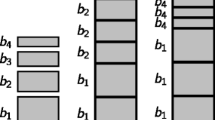Abstract
We consider two variants of the classical bin packing problem in which items may be fragmented. This can potentially reduce the total number of bins needed for packing the instance. However, since fragmentation incurs overhead, we attempt to avoid it as much as possible. In bin packing with size increasing fragmentation (BP-SIF), fragmenting an item increases the input size (due to a header/footer of fixed size that is added to each fragment). In bin packing with size preserving fragmentation (BP-SPF), there is a bound on the total number of fragmented items. These two variants of bin packing capture many practical scenarios, including message transmission in community TV networks, VLSI circuit design and preemptive scheduling on parallel machines with setup times/setup costs.
While both BP-SPF and BP-SIF do not belong to the class of problems that admit a polynomial time approximation scheme (PTAS), we show in this paper that both problems admit a dual PTAS and an asymptotic PTAS. We also develop for each of the problems a dual asymptotic fully polynomial time approximation scheme (AFPTAS). Our AFPTASs are based on a non-standard transformation of the mixed packing and covering linear program formulations of our problems into pure covering programs, which enables to efficiently solve these programs.
Similar content being viewed by others
References
Beling, P., Megiddo, N.: Using fast matrix multiplication to find basic solutions. Theor. Comput. Sci. 205, 307–316 (1998)
Braun, O., Schmidt, G.: Parallel processor scheduling with limited number of preemptions. SIAM J. Comput. 32(3), 671–680 (2003)
Brucker, P.: Scheduling Algorithms, 4th edn. Springer, Berlin (2004)
Coffman, E.G. Jr., Garey, M.R., Johnson, D.S.: Approximation algorithms for bin packing: a survey. In: Hochbaum, D.S. (ed.) Approximation Algorithms for NP-Hard Problems, pp. 46–93. PWS Publishing, Boston (1997)
Cormen, T.H., Leiserson, C.E., Rivest, R.L., Stein, C.: Introduction to Algorithms, 2nd edn. MIT Press/McGraw–Hill, Cambridge/New York (2002)
Epstein, L., Sgall, J.: Approximation schemes for scheduling on uniformly related and identical parallel machines. In: Proc. of the 7th European Symposium on Algorithms. Lecture Notes in Computer Science, vol. 1643, pp. 151–162. Springer, Berlin (1999)
Fernandez de la Vega, W., Lueker, G.S.: Bin packing can be solved within 1+ε in linear time. Combinatorica 1, 349–355 (1981)
Garey, M.R., Johnson, D.S.: Computers and Intractability: A Guide to the Theory of NP-Completeness. Freeman, San Francisco (1979)
Hochbaum, D.S., Shmoys, D.B.: Using dual approximation algorithms for scheduling problems: Practical and theoretical results. J. ACM 34(1), 144–162 (1987)
Karmarkar, N.: A new polynomial-time algorithm for linear programming. Combinatorica 4, 373–396 (1984)
Karmarkar, N., Karp, R.M.: An efficient approximation scheme for the one dimensional bin packing problem. In: Proc. 23rd IEEE Annual Symposium on Foundations of Computer Science, pp. 312–320, 1982
Leung, J.Y.-T. (ed.): Handbook of Scheduling: Algorithms, Models and Performance Analysis. Computer and Information Science Series. Chapman & Hall/CRC, Boca Raton (2004)
Mandal, C.A., Chakrabarti, P.P., Ghose, S.: Complexity of fragmentable object bin packing and an application. Comp. Math. Appl. 35(11), 91–97 (1998)
McNaughton, R.: Scheduling with deadlines and loss functions. Manag. Sci. 6, 1–12 (1959)
Menakerman, N., Rom, R.: Bin packing problems with item fragmentations. In: Proc. of WADS, 2001
Motwani, R.: Lecture notes on approximation algorithms. Technical report, Dept. of Computer Science, Stanford Univ., CA (1992)
Multimedia Cable Network System Ltd.: Data-over-cable service interface specification, http://www.cablelabs.com (2000)
Naaman, N., Rom, R.: Packet scheduling with fragmentation. In: Proc. of INFOCOM’02, pp. 824–831, 2002
Shachnai, H., Tamir, T., Woeginger, G.J.: Minimizing makespan and preemption costs on a system of uniform machines. Algorithmica 42, 309–334 (2005)
Sourd, F.: Preemptive scheduling with position costs. Algorithmic Oper. Res. AOR 1(2) (2006)
Spielman, D.A., Teng, S.-H.: Smoothed analysis of termination of linear programming algorithms. Math. Program. Ser. B 97, 375–404 (2003)
Todd, M.J.: The many facets of linear programming. Math. Program. Ser. B 91, 417–436 (2002)
Vazirani, V.V.: Bin packing. In: Approximation Algorithms, pp. 74–78. Springer, Berlin (2001)
Author information
Authors and Affiliations
Corresponding author
Additional information
A preliminary version of this paper appears in proceedings of the 3rd Workshop on Approximation and Online Algorithms (WAOA’05).
Rights and permissions
About this article
Cite this article
Shachnai, H., Tamir, T. & Yehezkely, O. Approximation Schemes for Packing with Item Fragmentation. Theory Comput Syst 43, 81–98 (2008). https://doi.org/10.1007/s00224-007-9082-x
Received:
Accepted:
Published:
Issue Date:
DOI: https://doi.org/10.1007/s00224-007-9082-x




